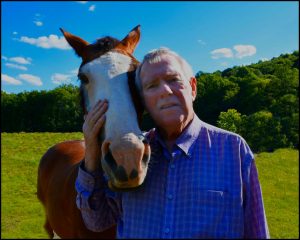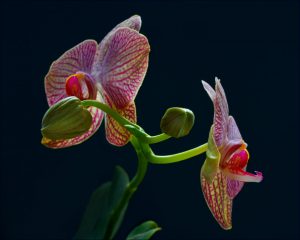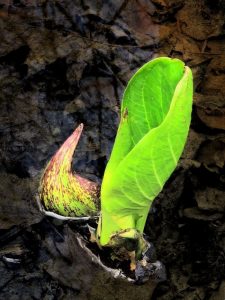WPFC, founded as an educational center for those interested in learning a theory about how families and organizations work, operates with the tenets of Bowen systems theory in paying attention to relationships, in thinking and managing self in ways that show the principles of the theory in action.
While there were six founders of the Center, there have been many, many contributors to the Center’s success. Most contributors are volunteers who recognize the good ideas in the theory and want to support their dissemination. Volunteers do their work quietly, not seeking recognition and taking satisfaction in the good that comes from these efforts.
 One of those volunteers was Linn Pittman, who died on October 6, 2020. He was a quiet fellow, a videographer extraordinaire, and he had an eye for capturing the essence of theoretical concepts with his camera. Heedless of the long drive home to Indiana that awaited him, Linn would stay late after Center events, dismantling the video equipment and returning the space to its everyday appearance. He was always generous with his time given to the Family Center.
One of those volunteers was Linn Pittman, who died on October 6, 2020. He was a quiet fellow, a videographer extraordinaire, and he had an eye for capturing the essence of theoretical concepts with his camera. Heedless of the long drive home to Indiana that awaited him, Linn would stay late after Center events, dismantling the video equipment and returning the space to its everyday appearance. He was always generous with his time given to the Family Center.
Linn produced many original videos of Dr. Bowen, Dr. Kerr, and others who came to Pittsburgh to support the Center’s work and to offer their expertise in understanding human behavior. Linn videotaped lectures, clinical conferences, annual symposiums and fundraisers, and in that context he documented the history of the Center. In doing this, he also got a solid base in the theory. His contributions remain part of the Center’s AV library.
 The remnants of polio left him single-handed as he lugged video equipment and laid cables, the equal of any TV or computer whiz. I never heard a complaint. His elegant photographs, taken at Polk Institute, graced the hallway at the Center.
The remnants of polio left him single-handed as he lugged video equipment and laid cables, the equal of any TV or computer whiz. I never heard a complaint. His elegant photographs, taken at Polk Institute, graced the hallway at the Center.
Linn was familiar with life’s cruelties. He spent a year in an iron lung as a child, separated from his family and staring for hours at the same walls and ceiling. Yet he grew up to be a renaissance man – loving the classics, able to speak in depth on philosophy, war time strategies, music, arts and history, and finding beauty in nature everywhere.
 Linn wrestled with cardiomyopathy for many years, saying it made him depressed but never altered his determination. His mind had a zest for life even if his energy failed him. Linn and I moved from being professional volunteers at the same organization to being friends after my son died. He stood beside me, a presence that gave me needed strength. He knew death too, having lost his wife and unborn child early on and then his second wife later. Rebirth was one of his subjects – every spring he photographed the reemergence of a skunk cabbage family in a creek near his home. The family always came back, different but there, year after year.
Linn wrestled with cardiomyopathy for many years, saying it made him depressed but never altered his determination. His mind had a zest for life even if his energy failed him. Linn and I moved from being professional volunteers at the same organization to being friends after my son died. He stood beside me, a presence that gave me needed strength. He knew death too, having lost his wife and unborn child early on and then his second wife later. Rebirth was one of his subjects – every spring he photographed the reemergence of a skunk cabbage family in a creek near his home. The family always came back, different but there, year after year.
I admired Linn as he made a special effort to know my husband and me. When he visited, he spent equal time with each one of us, engaging in totally different conversations. My husband valued him as a friend too and has his own sense of loss now that Linn is gone.
 Linn and I exchanged photos, exchanged narratives about those and sent our most recent pictures as a way to be connected. When Linn visited, all of us – Linn, my husband and I – would travel to local points of interest. Each of us had a unique photographic eye, and it was fun to come upon a scene and know it would make for a great photograph. At those times, we’d turn and smile at each other, knowing the other saw it too. No words were needed. I have an entire portfolio of his works. I will miss those exchanges and the pleasure of his company.
Linn and I exchanged photos, exchanged narratives about those and sent our most recent pictures as a way to be connected. When Linn visited, all of us – Linn, my husband and I – would travel to local points of interest. Each of us had a unique photographic eye, and it was fun to come upon a scene and know it would make for a great photograph. At those times, we’d turn and smile at each other, knowing the other saw it too. No words were needed. I have an entire portfolio of his works. I will miss those exchanges and the pleasure of his company.
Linn was a solid man, always interesting and unique, with a surprisingly naughty sense of humor. He was a cherished friend who made ordinary life more interesting. His photographs will shine a light on who he was for generations to come.
Catherine M. Rakow MSW, ACSW
Friend and WPFC Faculty Member
Thank you for sharing Linn’s story. I am only now learning of Linn’s death. From time to time, I’ve wondered what he’d been up to. He created a video of a dance choreographed by students at Indiania University of Pennsylvania; he scripted it to illustrate the emotional triangle. Uploading that to our website would be a tribute to his prodigious talent and appreciation for Bowen theory. Linn initiated a series of photographs of my parents with me and separately which I have displayed in my home. I will remember him as gentle and a little inscrutable. Perhaps that was his shyness. Farewell, Linn.
Annette, I did not know of the photographs of you and your family. As happens when someone dies, other facets of who the person was and their importance to others come out.
It has been a very long time since I saw the video illustrating the emotional triangle. This way of presenting ideas is now finding its place in electronic media, so perhaps Linn’s legacy will continue to reach to the future. A nice tribute to remember his volunteer contribution to the Center.
Catherine,
Thank you so much for writing in honor of Linn’s life and of his part in our community’s heritage. I also appreciated the inclusion of the photographs.
Mick Landaiche
MIck, that heritage also includes several original presentations of Dr. Bowen here in Pittsburgh, only available through the Center. There are very few videos of him available online so having original presentations in our library is a solid resource. Dr. Larkby uses these videos in a program she offers at the Center. And Linn filmed several conversations between Paulina McCullough, the driving force behind the founding of the Center, and Dr. Bowen. He did this as a volunteer and in recognition of McCullough’s and Bowen’s contributions to families. Paulina was the first non-medical school student admitted to Bowen’s class on Family Theory and Therapy at Georgetown University back in the early 1960s. These original materials are part of Pittsburgh’s community heritage, as you put it. Linn produced a long lasting resource re: Bowen theory
I did not know Linn but I feel a bit like I do now after your wonderful eulogy for him. What a good friend you are.
The funny thing after I wrote this was reflecting on how much I left out. Linn was a well-rounded fellow who never sought accolades or praise. Within me, it’s been interesting how other aspects of him or our relationship are still surfacing. The act of writing this has helped bring our living friendship to its new transition.
Catherine,
I remember Linn. I appreciate learning more about him through the beautiful portrait you painted of him. Thank you.
Thank you, Wendy. I expect several others associated with the Center in its first 25 years also remember him.
Catherine,
In this moving tribute to Linn Pittman you also pay tribute to what Linn was working toward. He actively supported documenting the ideas and helping to make Dr. Bowen’s ideas available. Believing in the mission of an organization and volunteering based on that belief is one of the hallmarks of differentiation as I understand it. Thank you for providing such a clear example.
I had heard the name Linn Pittman mentioned multiple times over the years, Catherine. Thank you for this, as I am finding that I’m thankful for Linn as well.
Ms. Whitney,
Linn created much of the video collection in the WPFC library materials by recording events of importance in the history of WPFC. Besides the Bowen lecture series, Linn videoed all the fundraisers. Those were efforts to use the arts in a way that represented aspects of the family found in Bowen theory. Many notables in the Pittsburgh art world took part in these events: Bingo O’Malley, Sam Hazo, for example. They did these at venues throughout the city. One was at The Frick Pittsburgh, where Henry Clay Frick’s granddaughter gave a history of the family. Linn certainly was a giving person seeking nothing beyond a job well done. He left a notable legacy. Catherine